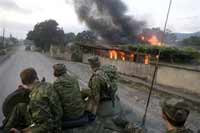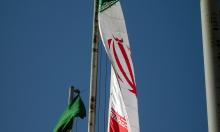Western media blatantly misinterpret conflict in South Ossetia
Western media have been paying a lot of attention to the situation with South Ossetia recently. Their opinion is especially important for Russia as a country directly involved in the conflict. The position of the Western media mirrors the public opinion in the West. US and British media outlets lay the entire blame for the conflict on Russia and Ossetian “separatists”, whereas German and Italian publications tend to take a more reasonable stance in their reports.

German experts see the reason of the current standoff in Mikhail Saakashvili’s stay at power. It is an open secret that Saakashvili’s prime goal in politics is to restore Georgia’s territorial integrity.
The majority of Western experts believe that if Saakashvili had agreed to return Georgia under Moscow’s guardianship, the Kremlin would have most likely declined its protectorate over South Ossetia and Abkhazia. However, Saakashvili intends to take Georgia to NATO and make it a country of oil and gas transit bypassing Russia.
The New York Times wrote that the reason of the conflict lies in provocations (bombardments) on the border. According to the logic of US analysts, it was the “separatists” who started the attacks first, whereas Saakashvili was innocent.
British observers from The Independent see the reason of the current bloodshed in Georgia’s wish to end tedious talks and start real actions instead.
Western journalists believe that Moscow simply used the fact of South Ossetian residents holding Russian passports as a pretext for the military interference. Some Russophobic publications even wrote that Russia considers the region the stronghold to reinstate its power on the territory of the former Soviet Union.
The New York Times wrote that Saakashvili stood up against Russia’s predominant role in the region.
The Times believes that the friction between Russia and Georgia intensified in April when Vladimir Putin decided to strengthen economic ties with South Ossetia and Abkhazia. US journalists were very concerned about the fact that Russia sent its fighter jets to patrol the S. Ossetian territory during Condoleezza Rice’s visit to Georgia.
The Wall Street Journal published slanderous information in an article shadowing Russian peacemakers in South Ossetia. The paper wrote that the Russian peacemakers were supposedly persecuting ethnic Georgians, making them vote at separatist elections. The newspaper also believes that Russia has chosen this way to take revenge on the West and to finally annex the two enclaves.
Foreign journalists have to acknowledge that Saakashvili has created an external enemy with his attack on S. Ossetia.
Unlike other Western publications, Italy’s La Repubblica does not declare South Ossetia a separatist state and tries to analyze arguments from both sides.
Latvia ’s Chas reminded that the conflict started after Georgia’s aggressive attack on Ossetian positions at night of August 2. The newspaper wrote that the conflict of 1989-1992 unfolded according to the same scenario. Latvian analysts believe that several Western countries and Ukraine destabilized the situation with their arms shipments to Georgia, which subsequently led to Saakashvili’s decision to attack Ossetia.
Many Western journalists think that the current conflict can also be described as a conflict between Russia and the West. German experts from Frankfurter Rundschau analyzed the roots of the Georgian-Ossetian standoff. They wrote that the conflict originally appeared during the Soviet times. When Georgia declared independence in 1991, Ossetia asked for its own authority. Georgia responded with an attack. Almost 2,000 people were killed in the war that lasted for 18 months. South Ossetia has been seeking Russia’s support since then, the newspaper wrote.
Die Welt wrote that many common Germans consider the events in South Ossetia a game that the USA launched on the threshold of the Beijing Olympics. German people refer to Saakashvili as an American servant. The majority of Germans support Russia’s actions in the standoff, the newspaper wrote.
German readers believe that George W. Bush can not cancel his plans to encircle Russia and to keep the USA’s status of the only superpower on the globe. The Germans urge the world to turn its back to the USA.
The Economist wrote that Saakashvili does not have the reputation of an immaculate politician in Europe. The defeat of the Georgian opposition in November 2007 struck a serious blow on the international image of Georgia.
The Wall Street Journal continues its journalistic insanity by claiming that it would be impossible to end the conflict without the interference of the West. The West has to do something to stop Russia’s aggression against the Western ally, the newspaper wrote.
The Washington Post wrote that the West can not maintain aloofness at this point because Georgia, as a staunch US ally, may eventually undermine USA’s prestige.
Sergei Balmasov
Pravda.ru
Subscribe to Pravda.Ru Telegram channel, Facebook, RSS!





